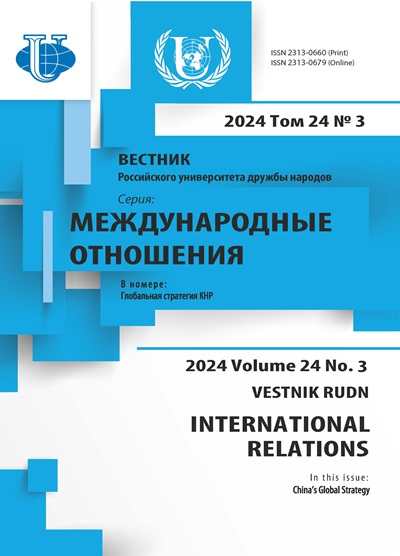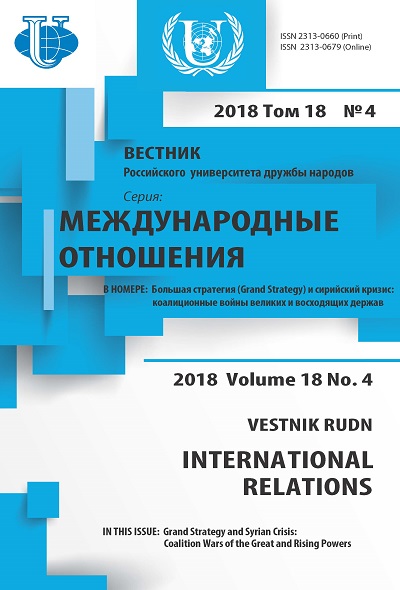Brazil’s 2019 BRICS Presidency: What to Expect from the Start of a New Decade of Cooperation and the J. Bolsonaro’s Administration
- Authors: Popova I.M.1
-
Affiliations:
- Russian Presidential Academy of National Economy and Public Administration
- Issue: Vol 18, No 4 (2018): Grand Strategy and Syrian Crisis: Coalition Wars of the Great and Rising Powers
- Pages: 925-941
- Section: INTERNATIONAL ECONOMIC RELATIONS
- URL: https://journals.rudn.ru/international-relations/article/view/20332
- DOI: https://doi.org/10.22363/2313-0660-2018-18-4-925-941
Cite item
Full Text
Abstract
BRICS is now entering a new decade of its activity. The institute enters a new decade in the conditions of a general multilateralism crisis, the growth of protectionist and nationalist sentiments even in the most liberal states, the leaders do not want to be responsible for solving key problems and do not have the power to cope with challenges by themselves. On the one hand, BRICS members need to deepen and intensify the cooperation to compensate for possible losses in cooperation with western partners, and, on the other hand, consolidate their position on strengthening their influence in the global governance system as a whole. BRICS membership has been one of the key priorities for Brazil’s foreign policy for the last years. This membership allows the country to develop relations with other major regional powers, and to consolidate the position on the most important issues both for BRICS countries and the entire system of global governance. Brazil’s numerous economic problems and a serious political system crisis led to the election of a radical anti-establishment candidate Jair Bolsonaro. BRICS agenda requires transformation to preserve and increase its influence and relevance in the international system. Under these conditions Brazil will begin its presidency in the institution. This study presents an analysis of the general context in which BRICS is now functioning, the problems and goals of Brazil’s current socio-economic and political development and the objectives of its foreign policy and the opportunities and limitations that are brought by Brazil’s presidency in BRICS.
About the authors
Irina Maximovna Popova
Russian Presidential Academy of National Economy and Public Administration
Author for correspondence.
Email: popova-im@ranepa.ru
Researcher, Center for International Institutions Research (CIIR), Russian Presidential Academy of National Economy and Public Administration
References
- Acharya, A. (2014). The End of American World Order. Cambridge UK: Polity Press.
- Almeida, P.R. (2009). Lula’s Foreign Policies: Regional and Global Strategies. In: Brazil under Lula: Economy, Politics, and Society under the Worker-President. Ed. by J. Love and W. Baer. NY: Palgrave Macmillan, p. 167—183.
- Borzova, A. (2015). The Role of the Brazilian Cooperation Agency in Promoting South—South Cooperation. International Organisations Research Journal (IORJ), 10(3), 156—169. doi: 10.17323/1996-7845-2015-03-156. (in Russian).
- Duggan, N. (2015). BRICS and the Evolution of a New Agenda Within Global Governance. In: The European Union and the BRICS. Ed. by M. Revizorski. Springer, p. 11—26. doi: 10.1007/978-3-319-19099-0.
- Larionova, M. (2012). Supply-Demand Model for Developing a Presidency Proposals for Reform Agenda and Priorities in Informal International Institutions (G20, G8, BRICS). International Organisations Research Journal (IORJ), 7(4), 7—17. (in Russian).
- Larionova, M. (2015). South Africa’s BRICS Presidency: Regional Power at the Helm of a Global Governance Forum. Vestnik RUDN. International Relations, 1, 125—134. (in Russian).
- Larionova, M. (2016). Russia’s 2015 BRICS Presidency: Models of Engagement with Interna¬tional Organizations. International Organisations Research Journal, 11(2), 113—139. doi: 10.17323/1996-7845-2016-02-113.
- Larionova, M. (2018). The G20, BRICS and APEC in the System of International Institutions: A Piece of Good News for Global Governance. International Organisations Research Journal, 13(1), 7—33. doi: 10.17323/1996-7845-2018-01-01.
- Larionova, M. (2018). The Rise of New Institutions. In: BRICS and Global Governance. Ed. by J. Kirton and M. Larionova. Routledge Publishing, p. 1—10.
- Milani, C.R.S. (2014). Brazil’s South—South Co-operation Strategies: From Foreign Policy to Public Policy, Global Powers and Africa Programme. South African Institute for International Affairs. SAIIA Occasional Paper. 2014. N 179. URL: https://carlosmilani.files.wordpress.com/ 2014/03/saia_sop_179_milani_20140311.pdf (accessed: 20.09.2018).
- Milani, C.R.S., Pinheiro, L. & Soares De Lima M.R. (2017). Brazil’s Foreign Policy and the ‘Gradua¬tion Dilemma’. International Affairs, 93(3), 585—605. doi: 10.1093/ia/iix078.
- Modi, R. (2014). BRICS and Bilaterals: Synergies and Contestations. In: The BRICS and beyond: the International Political Economy of the Emergence of a New World Order. Ed. by L. Xing. Farnham: Ashgate, p. 75—92.
- Okuneva, L. & Arapova, Е. (2017). BRICS on the World Stage: Novelties at the Present Stage of Development. Comparative Politics, Russia, 8(4), 147—157. doi: 10.18611/2221-3279-2017-8-4-147-157 (in Russian).
- Rodriguez-Dominguez, M. (2017). No Longer Activa e Altiva: Brazil’s Foreign Policy Stumbles under Temer. Council on Hemispheric Affairs. URL: http://www.coha.org/wp-content/ uploads/2017/11/Mari-Rodriguez-Policy-Under-Temer-1.pdf (accessed: 01.10.2018).
- Rosas Degaut Pontes, M. (2016). Ideas, Beliefs, Strategic Culture, and Foreign Policy: Understanding Brazil's Geopolitical Thought (Doctoral Dissertation). University of Central Florida, 2016. URL: https://stars.library.ucf.edu/cgi/viewcontent.cgi?referer=&httpsredir= 1&article=6105&context=etd (accessed: 12.09.2018).
- Safonkina, E.A. (2017). India’s 2016 BRICS Presidency. Asia and Africa Today, 7, 15—20. (in Russian).
- Safonkina, E.A. (2018). Chinese 2017 BRICS Presidency: Expanding Cooperation Horizons. Vestnik RUDN. International Relations, 18(2), 356—367. doi: 10.22363/2313-0660-2018-18-2-356-367. (in Russian).
- Skak, M. (2011). The BRIC Powers as Soft Balancers: Brazil, Russia, India and China. URL: http://www.brics.utoronto.ca/biblio/Skak_2011.pdf (accessed: 18.08.2018).
- Toropchin, G. (2017). From Goa to Xiamen. On Some Aspects of Political Cooperation within BRICS. International Organisations Research Journal (IORJ), 12(1), 174—188. doi: 10.17323/1996-7845-2017-01-174. (in Russian).
- Wade, R. H. (2011). Emerging World Order? From Multipolarity to Multilateralism in the G20, the World Bank, and the IMF. Politics & Society, 39(3), 347—378. doi: 10.1177/0032329211415503.











